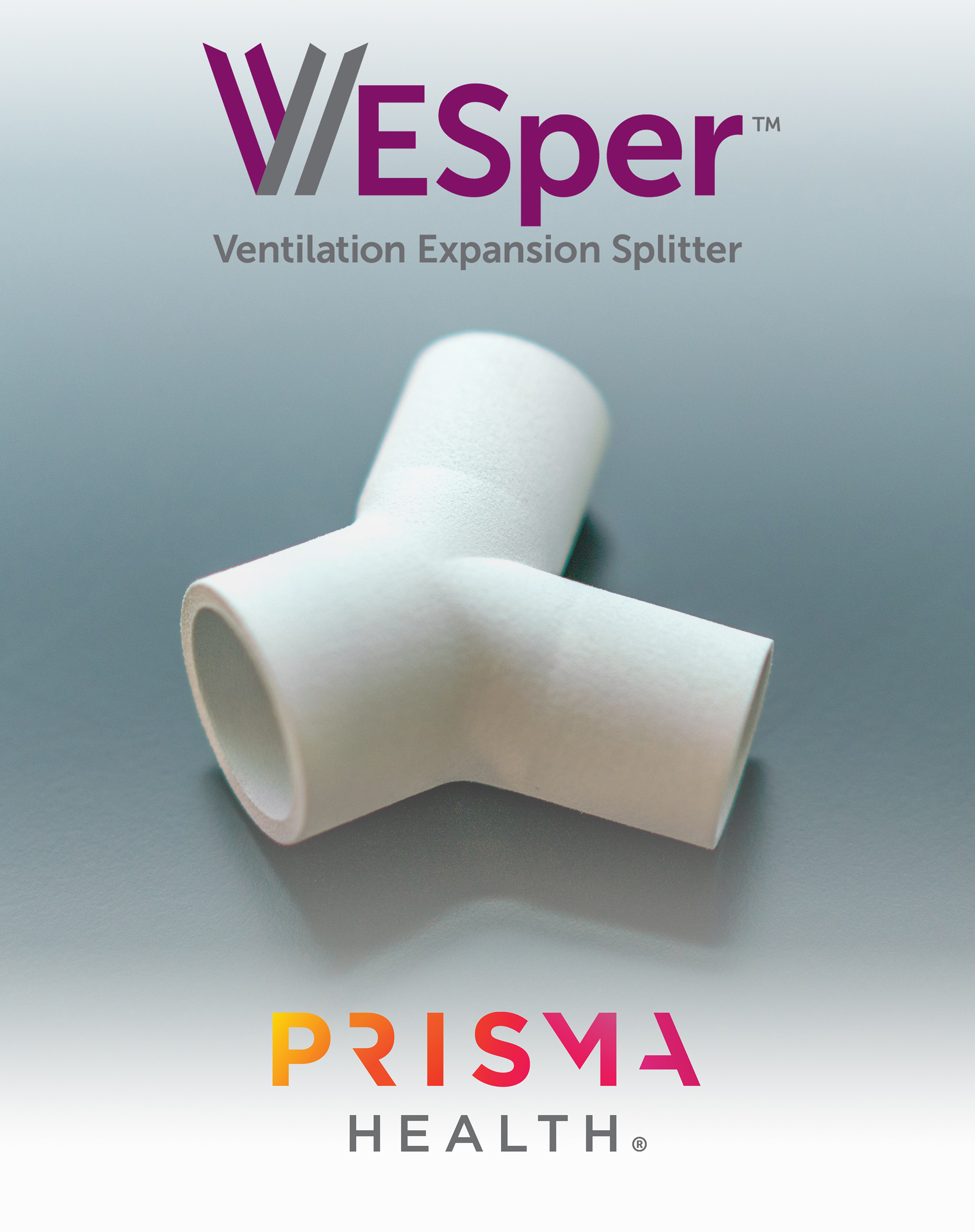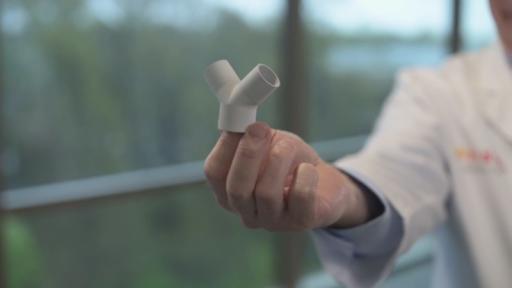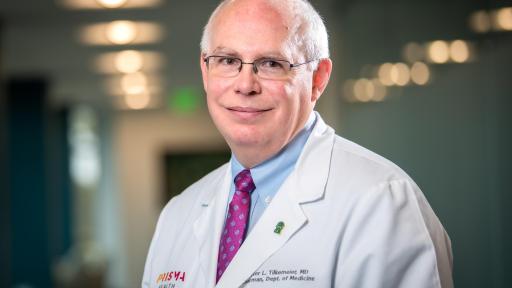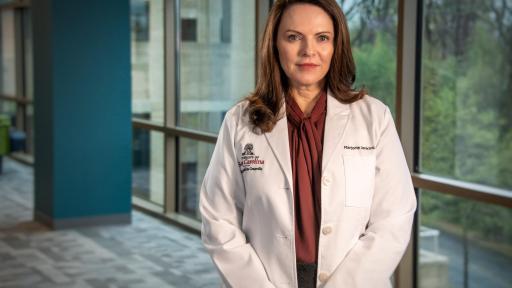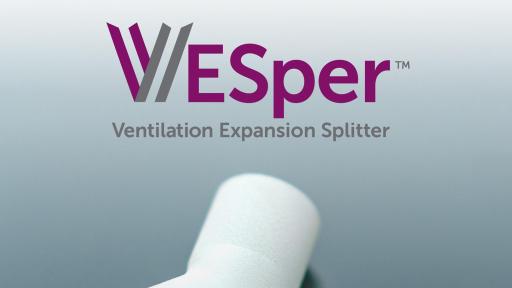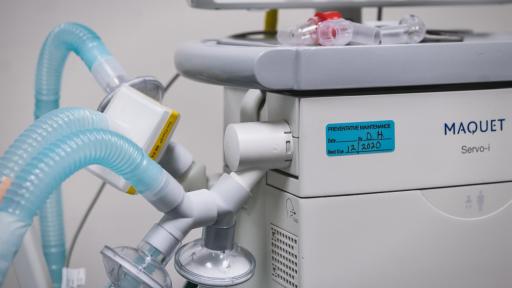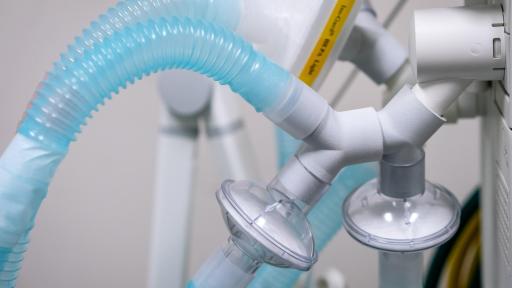Innovative ventilator device developed by Prisma Health to quickly increase ventilator capacity for COVID-19 patients
FDA gives emergency use authorization of “Y” splitter tubing to allow a single ventilator to assist up to four patients
Designed by Prisma Health physicians and a software engineer through quick teamwork, 3D printing and collaboration with universities
Greenville, SC (March 25, 2020) – Prisma Health announced today that it has received emergency use authorization from the U.S. Food and Drug Administration (FDA) for VESper™, a unique ventilator expansion device that allows a single ventilator to support up to four patients during times of acute equipment shortages such as the current COVID-19 pandemic. Produced using 3D printing technology, the device is developed with material already in use for medical devices and produced at minimal cost.
Prisma Health experts are working with national COVID-19 teams who have no more ventilator capacity and who can initiate emergency use of the prototype. We will be working closely with these teams during their field testing to monitor clinical outcomes. Those field tests will determine whether the device performs as designed, per FDA guidelines.
Emergency use authorization can offer critical care patients access to a medical device that has not gone through normal FDA approval; this is used when no comparable or satisfactory alternative options are available.
“When we see rapid increases in patients who require machine-assisted breathing, an acute shortage of necessary equipment can happen overnight,” said Peter Tilkemeier, M.D., chair of the Department of Medicine at Prisma Health-Upstate. “The VESper™ device can be lifesaving when the number of critically ill patients requiring breathing support is greater than the number of available ventilators. A number of U.S. hospitals are likely to begin experiencing this with COVID-19.”
A Prisma Health emergency medicine physician realized the opportunity of using a single machine to breathe for multiple patients. Working collaboratively with her husband, a software engineer and with a Prisma Health pulmonary critical care physician, this team began developing specifications for a “Y” splitter tubing that would meet international quality standards (ISO), be easily produced, allow for appropriate filtering of bacteria and viruses in the ventilator tubing, be strong and impact resistant, and would not impact the care of other patients connected to the same machine.
“Immediately, we realized we had an opportunity to impact patient outcomes all over the country, and potentially beyond the U.S.,” said Marjorie Jenkins, M.D., chief academic officer for Prisma Health–Upstate and dean of the University of South Carolina School of Medicine Greenville. “What we needed was a collaborative team to put the plan in motion and close the loop between design, production, FDA approval and distribution to hospitals with critical need.”
Drawing on the strength of Prisma Health’s existing academic partnerships, specifications were sent to engineers at Clemson University and University of South Carolina for 3D materials testing and printing of prototypes. The team began working to secure FDA approval and collaborations with private sector businesses came together within a matter of days.
Physicians used Prisma Health’s Healthcare Simulation Center to begin testing the VESper™ device with medical manikins, allowing for the simulation of multiple clinical scenarios. The device was able to deliver the appropriate breathing parameters without difficulty, creating an opportunity to pursue an application for emergency use authorization with the FDA to rapidly bring this life-saving device directly into clinical use.
Hospitals can begin to apply to receive the free source code and printing specifications for the device today by registering on Prisma Health’s Website www.prismahealth.org/VESper for their use in printing the VESper™ device. Prisma Health is collaborating with other major companies such as HP Inc. and its Digital Manufacturing Network to quickly scale 3D production of validated parts for distribution in areas of greatest need and areas with the potential to exceed their ventilator capacity in the near future, such as COVID-19 “hot spots” as designated by the Federal Emergency Management Agency (FEMA). Currently Prisma Health and South Carolina hospitals have enough ventilators available for patients.
“This is an exemplary demonstration of rapid innovation and collaboration,” said Mark O’Halla, president and chief executive officer of Prisma Health. “I am so proud of the creativity and perseverance of our clinical team who came together to develop a potentially life-saving solution at a critical time for our country, our communities and our patients. We are anxiously awaiting the results of the prototype field tests.”
About Prisma Health
Prisma Health is a not-for-profit health company and South Carolina’s largest private employer. With nearly 30,000 team members, 18 hospitals, 2,984 beds and more than 300 physician practice sites, Prisma Health serves more than 1.2 million unique patients annually. Its goal is to improve the health of all South Carolinians by enhancing clinical quality, the patient experience and access to affordable care, as well as conducting clinical research and training the next generation of medical professionals. For more information, visit PrismaHealth.org.
About UofSC School of Medicine Greenville
The School of Medicine Greenville is a partnership between the state’s largest university, the University of South Carolina (UofSC), and one of the largest health systems in the Southeast, Prisma Health. Located within the Prisma Health’s Greenville Memorial campus, the medical school graduated its first physician class in spring 2016. This “different school of thought” is dedicated to providing exceptional training for new physicians in transforming healthcare delivery. Learn more at greenvillemed.sc.edu.
About University of South Carolina
The University of South Carolina is a globally recognized, high-impact research university committed to a superior student experience and dedicated to innovation in learning, research and community engagement. Founded in 1801, the university offers more than 350 degree programs and is the state’s only top-tier Carnegie Foundation research institution. More than 50,000 students are enrolled at one of 20 locations throughout the state, including the research campus in Columbia. With 56 nationally ranked academic programs including top-ranked programs in international business, the nation’s best honors college and distinguished programs in engineering, law, medicine, public health and the arts, the university is helping to build healthier, more educated communities in South Carolina and around the world.
Contacts:
Deborah Fullerton, Prisma Health 312-399-7557 (cell)
Tammie Epps, Prisma Health, 803-318-1598 (cell)
Sandy Dees, Prisma Health, 864-303-4115 (cell)

